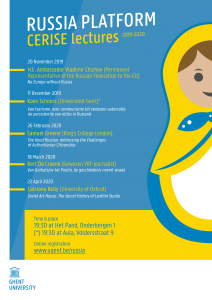Cancelled!
Samuel Greene (King’s College London)
Samuel Greene is reader in Russian politics and Director of the Russia Institute at King’s College London. His research focuses on the relationships between citizens and the state in Russia, and in societies experiencing social, economic and political transformation more broadly. His first book, Moscow in Movement: Power and Opposition in Putin’s Russia, was published by Stanford University Press in 2014. More recently, he is co-author with Graeme Robertson of Putin v the People: The Perilous Politics of a Divided Russia, published by Yale University Press in 2019. He also serves as Associate Fellow in the Russian and Eurasian Programme of the International Institute for Security Studies and a Visiting Professor at the UK Defence Academy.
The idea of the authoritarian citizen presents a conundrum for students of politics. Classical descriptions of autocracies see citizens as demobilized and controlled, and thus largely written out of the political equation. Increasingly, however, research has elucidated the ways that authoritarian leaders rule with the masses, rather than despite them. The idea that the power of a leader such as Vladimir Putin is co-constructed – that it is produced and reproduced simultaneously and continuously by rulers and ruled – only gets us so far, however, leaving unanswered important questions about how people interpret and navigate the political and social trade-offs inherent to life in authoritarianism, and why some people dissent. This discussion will begin to re-open some of these questions from the bottom up, asking how and why Russian citizens come to understand power the way they do, and whether we need to revisit our own notions of authoritarian citizenship as a result.
